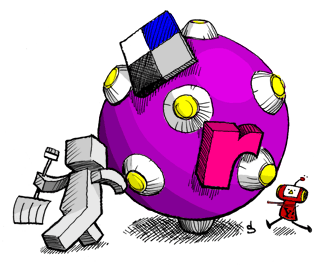Silicon Valley Damashii, or, the Yahoo! endgame
So it appears (though it is still a rumor) that Yahoo! is all set to acquire Digg.
Why is Yahoo! buying up all these niche websites?
Delicious, started by Joshua Schachter as a multi-user version of his personal linkblog, is an online bookmark manager with some social features. It’s often credited with popularizing freeform tagging (“folksonomy”) as the only categorization system that’s lightweight enough for users to stick with, and yet meaningful enough to actually help organize things. Flickr, a side project of some guys working on a multiplayer game world, is the result of waving the tagging wand over a straightforward photo-sharing application (with some well-designed user interface thrown in to make an even more compelling experience).
And now the rumors are flying that Digg will be the next object to get rolled up in Yahoo!’s big stickyball of acquisition. Like Delicious and Flickr, Digg does one thing pretty well: It lets users post links, and vote on the links posted by other users. Highly-rated links bubble up to the front page, providing a live view of what’s currently hot on the Web. (Links show up there substantially faster than on Metafilter or Slashdot can keep up with; those sites rely on users writing thoughtful articles—and in Slashdot’s case, surviving the site’s editorial process—in order to get something posted on the front page. With Digg, it’s entirely community-controlled and automated. Also in this mold: Reddit, which has a slightly finer-grained commenting and voting system; it too is an independent company, for the time being.)
There’s another common feature of these sites: They’re not technically sophisticated. Oh, there’s almost definitely a lot of tricky, smart, solid engineering behind the Delicious database schema or the Digg load-balancer; it would also be criminal to criticize Flickr’s slick DHTML user interface (what the kids today are calling AJAX) as anything less than clever and well-executed. But this is work that any engineering firm could produce out of thin air by throwing one or five or a dozen BSCS programmers at the problem for a few months. Especially now that these small, innovative firms have shown the way forward.
Put another way, the thirty-million-dollar question is exactly why Yahoo! would bother to buy these sites, rather than clone them with internal talent. (I’m not the only one who’s wondering.) High-tech firms, especially large ones with sufficient confidence in their engineers (I’m looking at you, Google), have a proclivity for developing software with internal resources rather than look elsewhere. (Read: “Not Invented Here” is alive and well.)
So, back to our question. Why buy now? Is it the data? Probably not; you can scrape links and tags off of del.icio.us for free, if you really want it. Digg, too. Besides, Yahoo’s already (ostensibly) spidering the web all the time, so presumably they’ve already got all this data anyway (although there was recently a bit of a surprise when they appeared to concede the search war to Google in an interview). Is it the employees? Possibly, but no matter how awesome Schachter is, it’s hard to believe he’s worth 30 megabucks on his own. I don’t know how many employees Digg staffs at the moment; clearly there are a few, so maybe these guys are all worth hiring. But Y! could probably hire some or all of them away with solid salaries short of a full acquisition.
I think I know what Yahoo! really wants to buy. Not raw data, not employees, but users. Yahoo! wants Digg’s user base. And Delicious’, and Flickr’s, both of which it already has. These are the Web’s power users, the creators of information: these people generate blog posts and photos; they find the best links; they tag and classify all that content; and then they write thoughtful (or infantile) comments on social bookmarking pages about it all. And soon (whether or not Digg is the site Y! chooses to acquire), in time all of that will be under the bright purple Yahoo! umbrella.
Because—and this is the Yahoo! endgame—it really doesn’t matter who owns the #1 search engine, if all the links point to your Web properties.

